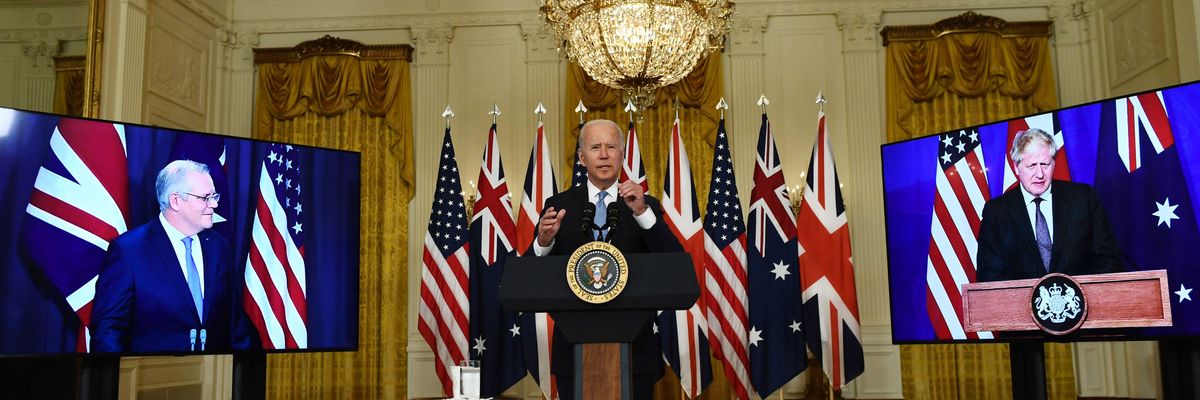Echoing concerns raised by international activists over the perils posed by the three-nation AUKUS agreement, delegates at the U.K. Labour Conference on Monday voted to condemn the new military pact between Australia, the United Kingdom, and the United States as a threat to world peace.
"I want to live in a peaceful world. And if we've got differences with people, as we have on human rights, then challenge... then support those in those societies that are demanding their rights."
--Jeremy Corbyn, Labour MP
Labour Party members voted 70.35% to 29.65% on the motion condemning AUKUS during the Brighton conference, according to The Independent. The Labour delegates join global peace advocates and nations including China--whom critics say the pact seeks to contain--in denouncing the agreement.
Countering Conservative British Prime Minister Boris Johnson's claim that AUKUS will "promote stability" in the Indo-Pacific region, the motion stated that "this is a dangerous move which will undermine world peace," and that the conference "resolves to oppose the AUKUS agreement and make appropriate moves to de-escalate the situation."
The Guardiancalled the motion "an embarrassment" for Labour Leader Keir Starmer, who recently told Parliament that the party "welcomes" the "increased cooperation" with Britain's allies.
In a further embarrassment, the motion's results were announced shortly after John Healey, the shadow secretary of state for defense, declared that "Britain will be democracy's most reliable ally," and that the country "will no longer be half-hearted about essential alliances and treaties."
Jeremy Corbyn, the former Labour leader who represents Islington North in Parliament, called AUKUS "crazy beyond belief" during a peace conference over the weekend.
Speaking Saturday at The World Transformed conference--also in Brighton--Corbyn rejected the notion that Britain, a country of "65 million people, northwest coast of Europe, tiny proportion of the world's population, should have a global arms presence and involve ourselves in an alliance that can only lead to rearmament of the West and of China, and of Russia at the same time."
"I want to live in a peaceful world," Corbyn said. "And if we've got differences with people, as we have on human rights, then challenge, then take it up, then support those in those societies that are demanding their rights, work with them."
"But the idea we're going to sort of bomb our way into these things is simply not very sensible," he added. "Let's learn the lessons of Afghanistan and Iraq, of Libya, of Syria, and talk to the 70 million people who are refugees around the world, many of whom are victims of war. We can do things differently."
Under the AUKUS agreement, Australia will acquire its first nuclear submarine fleet, a development that has alarmed China, enraged and humiliated France--with whom Canberra reneged on a deal to purchase diesel subs--and placed New Zealand, a nuclear-free state, in the position of having to ban some of its closest ally's naval vessels from entering its waters.
However, it is the specter of an accelerated regional nuclear arms race that has raised the most alarm among AUKUS opponents, as well as critics of the Quadrilateral Security Dialog--the so-called "Quad"--a strategic engagement between Australia, India, Japan, and the United States. Beijing warily eyed a meeting of "Quad" leaders last Friday at the White House in Washington, D.C.
Carol Turner of the Labour Campaign for Nuclear Disarmament wrote last week that "far from promoting stability in the Indo-Pacific, AUKUS will generate greater military tension that could contribute to another round of nuclear proliferation."
"AUKUS is the next step in a new cold war with China," she added. "It makes the Indo-Pacific, and the world, a more dangerous, not a more stable, place."
